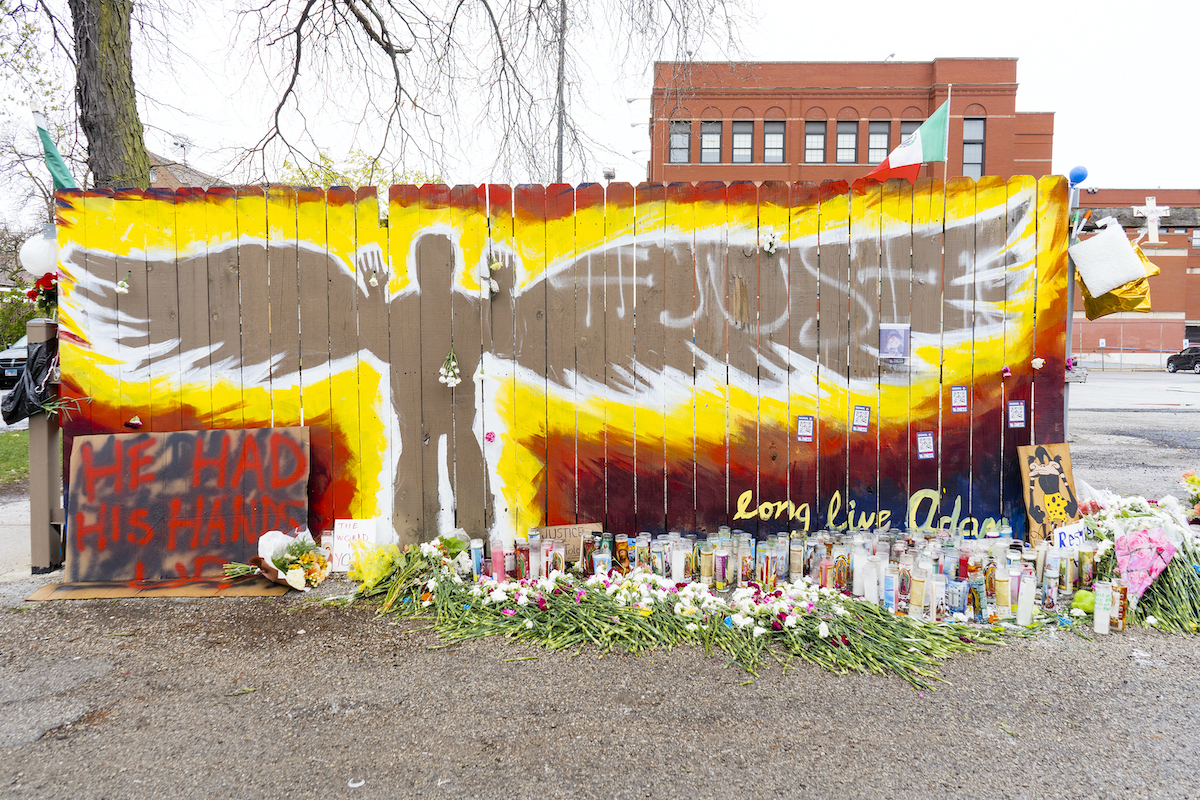

The makeshift memorial for Adam Toledo in Chicago’s Little Village (Photo by Mateo Zapata/@mateoxzapata)
I don’t need to watch the footage of Ma’Khia Bryant, a 16-year-old girl getting murdered by police.
I don’t need to watch Adam Toledo being murdered by the police at the age of 13.
For the same reason, I didn’t need to watch George Floyd fight for his life to prove that Derek Chauvin murdered him.
I know racism, anti-Blackness, and white supremacy not only exist but guide our police system.
As I watch the outrage unfold after yet another Black person —in this case, a child’s entire life is stolen at the hands of yet another police officer— I ask why. Why do these videos continue to be released to the public, as if the word of a witness, mother, or father isn’t enough? It is as if with each video, law enforcement hopes we will become sympathetic to the situation. That seeing Ma’Khia holding a kitchen knife or watching Adam hold a gun moments earlier will change our minds.
I do not need proof or to consume the visual pain of a person’s last breaths in order to believe racism exists and is too often deadly.
And neither should anyone.
When Breonna Taylor was murdered and the body camera footage was released, I didn’t need to see her last moments. I believed immediately that police would murder a young Black woman in her own home. I believe these pieces of footage, each uniquely painful, belong in a courtroom and not in the feeds of everyday Americans.
It is this hunger for proof that continues the racism of today. Without proof, how would white people believe the pain and suffering Black Americans were experiencing? It was never enough to tell them or write about the pain they had experienced. In order to have a chance at sympathy, racism’s most brutalized victims have to display their pain and struggle for all to see. The act of white people not believing racist acts until Black and Brown people expose and relive their traumatic events is racist in and of itself.
White supremacy has created institutions that hold the reins of power, effectively gatekeeping the path to justice in our country. It is this reality that continues and perpetuates imbalance and the reason that we even film in the first place. It is not because Black or Brown people need to be persuaded of the injustice that occurred—it’s because it’s the only way to convince the white systems of power. Do you really think Derek Chauvin would have been convicted if the video of him murdering George Floyd didn’t just exist but had gone viral?
With every life taken at the hands of police, Black and Brown people continue to be traumatized by the footage shared on social media and the news. Watching people who are mothers, fathers, sisters, and brothers systemically and violently taken away serves as a constant reminder that fear is justified. That anyone of us could be next.
It is also traumatizing in another way: many are forced to process their grief while digesting the shock many white folks perform as they “discover” the racism that’s existed all along. It is equally this disbelief, this shock that we could live in a country that allows this to happen, that this is in fact America that reinforces why we have these videos. Because white people have to see it to believe that this could be true and has been true.
Still, I wonder about the white folks who watch these videos.
Outside of the court and judicial system, Black and Brown folks should not have to record and market our pain to be believed, whether it’s family separation or the latest life lost at the hands of police.
Because that’s what a viral death video is: the ability to watch our suffering and decide if it merits action or not. If a child should have been murdered by those who pretend to protect.
It shouldn’t take a video or an open casket.
Our word should be enough.
***
Nicola Schulze is the co-founder of LatinaMedia.Co and the person behind communications at the Women’s Foundation California, a publicly supported foundation dedicated to achieving racial, economic, and gender justice by centering the experience and expertise of communities most impacted by systemic injustice. Twitter: @neaschulze.


